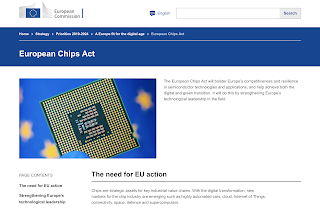The European Commission is calling for €43 billion euros of public and private investments to spur the design, manufacturing and packaging of advanced semiconductors in Europe.
The EU Chips Act aims to bring about a thriving semiconductor sector from research to production and a resilient supply chain. The ambition is for the EU to double its current market share in semiconductors to 20% in 2030. Key elements of the proposal:
The main components are:
- The Chips for Europe Initiative will pool resources from the Union, Member States and third countries associated with the existing Union programmes, as well as the private sector, through the enhanced “Chips Joint Undertaking” resulting from the strategic reorientation of the existing Key Digital Technologies Joint Undertaking. €11 billion will be made available to strengthen existing research, development and innovation, to ensure the deployment of advanced semi-conductor tools, pilot lines for prototyping, testing and experimentation of new devices for innovative real-life applications, to train staff and to develop an in-depth understanding of the semi-conductor ecosystem and value chain.
- A new framework to ensure security of supply by attracting investments and enhanced production capacities, much needed in order for innovation in advanced nodes, innovative and energy efficient chips to flourish. In addition, a Chips Fund will facilitate access to finance for start-ups to help them mature their innovations and attract investors. It will also include a dedicated semiconductor equity investment facility under InvestEU to support scale-ups and SMEs to ease their market expansion.
- A coordination mechanism between the Member States and the Commission for monitoring the supply of semiconductors, estimating demand and anticipating the shortages. It will monitor the semiconductor value chain by gathering key intelligence from companies to map primary weaknesses and bottlenecks. It will draw together common crisis assessment and coordinate actions to be taken from a new emergency toolbox. It will also react swiftly and decisively together by making full use of national and EU instruments.
Commission President Ursula von der Leyen said: “The European Chips Act will be a game changer for the global competitiveness of Europe's single market. In the short term, it will increase our resilience to future crises, by enabling us to anticipate and avoid supply chain disruptions. And in the mid-term, it will help make Europe an industrial leader in this strategic branch. With the European Chips Act, we are putting out the investments and the strategy. But the key to our success lies in Europe's innovators, our world-class researchers, in the people who have made our continent prosper through the decades.”
https://ec.europa.eu/info/strategy/priorities-2019-2024/europe-fit-digital-age/european-chips-act_en
- Earlier, the government of Netherlands committed 230 million euros for participation in a so-called Important Project of Common European Interest (IPCEI) in the field of microelectronics. This project is expected to support the objectives of the Chips Act and the European tech industry.














